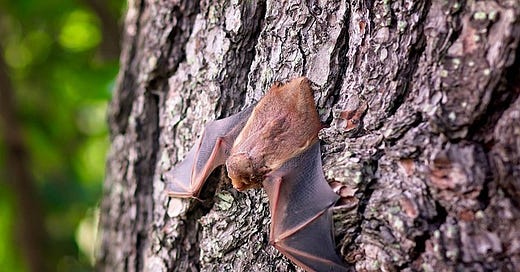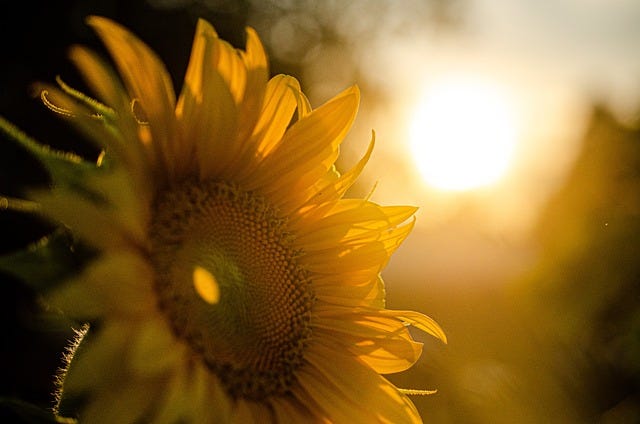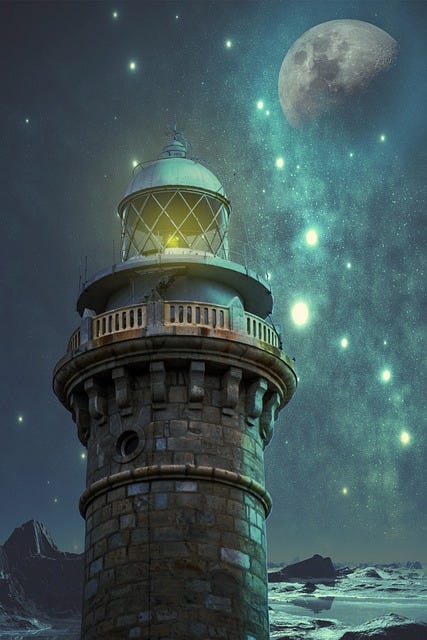The Tower: Part 2: Mabon
Post #4: In which a news web begins to take shape ...
(If you are a new subscriber, you might want to start at the beginning of the Webbd Wheel Series with The Hanged Man. If you would like to start at the beginning of The Tower, go here. If you prefer to read Parts 1 and 2 in their entirety, go here. For the next serial post, go here.)
CHAPTER 2
MIRMIR
“Flittermousse. Wake up, ssleepyhead!”
Ash, deep in a dream of a dark tide of light-drugged insects swirling around the top of a tall tower at the sea’s edge, opened his eyes. He smelled wood, not stone and saltwater. He nestled, upside down, within Yggdrasil’s body. Mirmir, the Tree of Life’s guardian, was waking him.
He yawned, showing sharp teeth. He’d flown through the previous night to reach Yggdrasil’s shelter before dawn.
He knew Mirmir anxiously awaited the latest news.
“’Flittermouse’ makes me feel like a character in an old fairytale,” he grumbled in his high-pitched voice. “Why can’t you call me Ash, like everyone else?” He made his way to the entrance to his small bedchamber and squeezed out past Mirmir’s large flat head.
“I like the way flittermousse rollss on my tongue,” said Mirmir with a sardonic smile. “What news?”
“I’m not going to talk to you until I’ve eaten my breakfast,” said Ash. He stretched his wings, one at a time and then together, and groomed himself with a few quick licks.
“Verdani hass lit the lampss,” said Mirmir in his sibilant voice. “Be quick! I want to talk.”
Ash, thoroughly awake, flew soundlessly into the night. This late in the year insects were not so plentiful as during the summer, but enough moths, spiders and mosquitoes still congregated around light sources and over water to satisfy his hunger. He made several circles above the Well of Urd, where passing swans occasionally paused to rest and drink, and returned to Mirmir.
“What do you want to hear first?” he asked when he’d arranged himself comfortably, upside down under a limb. Mirmir stretched out along the top of the branch, his head close to the small brown bat. “I’ve visited the lighthouse, Hades, and the underground colonies among the Dvorgs.”
“Sstart after we lasst talked,” said Mirmir. “Where did you go when you left here?”
“I went home to the underground colonies. I can’t live in a heap all the time, but I don’t like to be alone too long, either. There’s nothing like hunting on a long summer’s night with hundreds of your kin around you!”
“Yess, yess,” said Mirmir impatiently, “but what newss?”
“No real news,” said Ash. “There’s just a strange sort of feeling.”
“A feeling?”
“Yes. A kind of tension. The Dvorgs aren’t exactly ebullient, as you know, but they seem more dour than usual lately. Also, we notice increasing conflict between the Dvorgs and Dwarves. The colony described loud arguments and shouting matches, even fights. The Dvorgs say the Dwarves are weak and poison the Dvorg’s purity. Dwarves have lost their way and defile the Dvorg’s traditions and pride. The Dwarves say the Dvorgs are rigid and limited; they’ll destroy both races because of their intolerance, arrogance and ignorance of Webbd and its people.”
“The Dvorgss have long ressented the Dwarvess,” said Mirmir.
“Yes, but they’ve tolerated one another and managed to work together,” said Ash. “Now their work is suffering. If they refuse to work together, they can’t build for humans, because the Dvorgs won’t go aboveground, and if they don’t sell or trade their skills, they can’t get food. Or sunflower seeds.”
“Ssunflower sseedss?”
Ash grinned and inflated his furry brown chest. “There’s a Dvorg called Slate, one of the worst hardliners about race purity and all that. He’s addicted to sunflower seeds, but he hates everyone and everything having to do with above ground, so he’ll only buy them from Hades’ and Persephone’s garden. Somehow, he’s convinced himself he isn’t really having anything to do with above ground if he buys from them. He tromps through the tunnels and caverns like this—” Ash fixed his hairy face in a glare and stalked along the branch, swinging his body aggressively. He turned his head to one side, puckered his mouth into an ‘O’, stuck out his pink tongue and made a shrill explosive spitting sound, “Ptoo!”
Mirmir writhed with laughter. “Sss! Sss! Sss!”
“He spits out sunflower seeds wherever he goes, so we know where he’s been by the smell,” said Ash, pleased with Mirmir’s appreciation of his mimicry.
“Slate’s creating bigger problems than friction between the Dwarves and Dvorgs,” Ash continued. “He’s also challenging the Dvorgs’ oldest spiritual practice. He says Pele, Lady of Flames, is nothing but a superstitious lie, and honoring a female (he calls females tuls) is beneath the race of Dvorgs. He insists belief in Pele weakens rather than strengthens them.”
“How have they traditionally honored Pele?” asked Mirmir with interest.
“For time out of mind they’ve offered her their finest gems and crystals, always with a fire ritual, of course. Pele’s fire salamanders appear, take the offerings into the fire’s heart, and disappear. The Dvorgs call them ‘sals’. Slate says it’s nothing but an ancient deceit on the part of the fire salamanders, who collect treasure for their own purposes and without paying for it. Slate’s a great one for extracting payment for everything. He doesn’t believe in giving anything away. He loves to play marbles, but he only plays with the most precious gems and minerals, and he plays to win. In his view, anything made of material from underground belongs, by right, to the Dvorgs.”
“Iss Pele real?” asked Mirmir.
“What’s real?” Ash asked. “The fire salamanders are real. Rock and mines are real. Mineral, stone, gem and fire are real. The Dvorgs call Pele Stone Shaper and some believe the rock they spend their lives working with came from her. I’ve never seen her, but the fire salamanders have, and they say she has great power, power enough to melt rock, build islands and destroy mountains. They say Pele exists without the Dvorgs, but the Dvorgs can’t exist without her. I can’t see the harm in offering such power a few crystals and gems for gratitude’s sake, if nothing else. The Dvorgs possess a never-ending supply, and they’re not poor.”
“Thiss Sslate ssoundss like the tight-fissted ssort,” said Mirmir.
“He is. He stumps around saying ‘Only the stone! The stone above all!’ All in all, he’s causing quite a bit of tension. Dvorgs don’t like change. Most of them aren’t nimble thinkers and they hold fast to resentments and grudges. Slate’s talk enlarges their native distrust of anything outside their mines and caverns and their dislike of anything female.”
“They think they can ssurvive without a balance of male and female?” asked Mirmir, shaking his head back and forth. “They eat, don’t they?”
“That’s exactly what they think,” Ash assured him. “Slate hasn’t a thought for where food comes from, as long as it arrives, and plenty of it, as cheap as possible! He’s never gone aboveground at all. Hasn’t got a clue.”
“Anyway, after I left my colony I visited Hades. The queen, Persephone, expects a child. Lord Hades is all smiles and can hardly wait for her return. She’s spending the summer with Demeter, of course.”
“I knew that already,” said Mirmir, disdainful. “Verdani told me during her sspring sspinning. So far, you’ve said nothing very interesting.”
“Next time let me sleep in, then,” snapped Ash, “and I’ll take my time over breakfast!”
“What about the tower?” inquired Mirmir with pronounced politeness.
“The lightkeeper is dead. You remember his name was Irvin and he was a merman?”
“The poet. I remember.”
“Yes. I like the tower, as you know. The light attracts insects from miles around. Irvin was a good sort, quiet and dreamy. He never missed a night with the light and he had interesting visitors. His daughter visited often him and many of the passing ships knew him. I was fond of him.”
“What happened?”
“He was out on the cliffs one day. I don’t know what he was doing, but he liked to wander up and down the rock ledges and the shore, looking at nothing in particular and scribbling notes or simply sitting, watching the sea and the birds. A freak wave washed ashore and swept him into the water. For some reason, he didn’t change into his merman shape. Maybe he was injured before he had a chance to. Anyway, he drowned.”
“I wonder who will tend the lighthousse now?”
“I don’t know,” said Ash, “but I’ll miss Irvin, and until a new keeper comes that will be a dangerous channel again.”
“Huh,” said Mirmir. “Nothing of much interesst this time.”
“Now it’s your turn. Enchant me with your news, oh Sheherazade!”
Mirmir grimaced. “My newss is worrissome. I hoped you’d distract me from it. Skuld is ill.”
“Ill?” said Ash blankly.
“Ill. As in, she isn’t working. She says she’s too tired. She refuses to cut the thread. She says we’re running out of beginnings and if she continues to cut the thread to make endings one day soon everything will stop. In between saying things like that she moans and groans and sighs about how old she is, how her bones ache and how fearsome it is to be a used-up old woman.”
“How old is she?” asked Ash.
“Old enough to know better!” hissed Mirmir. “The Norns are eternal, ageless, immortal. Like me!” He drew himself up proudly.
“I get them confused,” said Ash. “Skuld is the one who manages what shall happen and cuts the thread, right?”
“Right,” said Mirmir. “And Urd oversseess what hass happened and windss the disstaff, which is Yggdrasil. And Verdani spins what is happening. I’m worried about her, too. She and Urd are doing the best they can to cover all the work, but they can’t do what Skuld does. All three of them are needed.”
“What will happen if Skuld … doesn’t get better?” asked Ash.
“I don’t know,” said Mirmir, sounding wretched. “How can the wheel turn without her? Can she ever be replaced? If this can happen to her, might it happen to Verdani, or Urd?”
Or you? Ash thought to himself, feeling sad for his friend.
“That’ss not the only worry,” said Mirmir. “Something is wrong with Yggdrasil. It’s …shedding.”
Ash looked around. “It looks fine to me.”
“It lookss fine here, but you know thisss tree supports the cossmoss and its rootss go down to the world’ss ccenter?”
“Yes,” Ash nodded.
“Well, I’ve sseen the top, where branches intertwine with the ssky. Small twigs and branches are breaking from there and falling. I can tell where they came from because they’re frosted with star dust.”
“What do the Norns say?”
“I haven’t told them. They’ve enough to worry about with Skuld’s illness.”
“What do you think it means?”
“I don’t know,” said Mirmir, “but I’m worried.”
HADES
Hades rode through the night to Valhalla on his black stallion, his wolf Hope like a gray ghost at his stirrup.
Odin had given him the wolf pup around the same time Persephone had come to him, and he well knew in naming the animal Hope he placed himself at a disadvantage in the eyes of many. Not unlike Odin himself, who had an unfortunate (in the opinion of some) and puerile weakness for marbles, Hades knew himself to be the subject of secret amusement and mockery.
He didn’t care. The green-eyed wolf bitch was Hope from the beginning, and now, in her fierce graceful prime, he couldn’t have renamed her if he’d wanted to -- and he didn’t want to.
The horse under him and the wolf beside him were the only warmth in his life, the only light, the only companionship since Persephone had left.
He felt maimed without her, but he understood why she’d needed to leave. His own grief felt unendurable. Hers added to his became impossible to bear.
Thus, in this harvest season, normally a joyous time of reunion with his queen, he rode alone to take counsel from Odin, one of the few whom Hades truly respected. In the bewilderment and exhaustion of grief he felt unable to come to any decision about what to do. Search for Persephone? Beg her to come home? Wait and hope for her return? Send someone to help her? How could he face his life and work in the Underworld without her? What did a woman need and want after losing a child? Must he set her free now -- forever? She blamed him, he knew, for the child’s death. Was he unable to father a child? Was death his only offspring? Yet children were lost, sometimes. Might they yet have a child -- many children?
Would she ever lie with him again?
Did she still love him?
Dawn found him at Odin’s hall. Hades refused a stable boy’s help, leading the stallion to a stall and seeing to his needs himself. The boy brought a bloody chunk of raw meat from Odin’s slaughterhouse for Hope, which she disposed of outside somewhere before finding Hades in the stall. He gave her water and she drank and settled down in a corner to sleep.
Odin breakfasted at his enormous table in the hall. The sun shone through high windows, making a brassy glare of the golden weapons from which the rafters were made. The one-eyed old man greeted Hades silently with a nod at a place laid ready next to his own carved seat. Valkyries brought smoking meat, fresh bread, honey, cream and mead.
He could eat at this table, where there were no memories of Persephone, and Hades felt grateful for the steadying ballast of food in his belly.
When they had finished, Odin rose, said, “Come,” and left the hall.
They entered a walled garden behind the hall through an iron gate, which Odin closed behind them with a satisfying clang. Hades saw grapes clustered like dark jewels and neat gardens with a final flush of chrysanthemums, sunflowers and daisies. Against one wall stood two comfortable deep-cushioned chairs with a table between them. The wall cupped and reflected the autumn morning sun. Creamy-pink mushrooms clustered at the base of a wooden post. Odin settled himself in one of the chairs with a sigh of pleasure, and for a moment became an aging scarred old man, weary with years and glad to take his ease.
“Death has come into your house,” said Odin when they were settled.
Hades laughed mirthlessly. “My house has long been filled with death.”
“No,” replied Odin. “Yours is the kingdom of death, but for others, not for you. Until now. Now you know the scent of Death’s breath. It’s not something only for others.”
Hades couldn’t speak.
“Your grief is important and true,” said Odin. “It belongs to you and there’s no shame in it. I’ll do what I can to assist you to bear it. But, Lord Hades, there is a whisper, a thread, a growing filament of grief in the cosmos. Something is wrong at Webbd’s core. Some tiny part of life’s scaffold weakens. Do you know Yrtym?”
“Yurtem?”
“Yrtym. It means threads of matterenergytime. It’s the net holding all life. The wind whispers to the stars, and the stars to the sea, and the sea to the stone, of a disturbance in the Yrtym. None can say what’s wrong, but it appears something is wrong, and the wind trembles.”
“Is there anything we can do?” asked Hades. He felt desolate. Not only this sudden rift in his happiness and dreams with Persephone, but some much bigger threat to contend with?
“There’s nothing and everything we can do,” replied Odin. “We must go forward. It’s as simple and difficult as that.”
“What can I do for Persephone?” asked Hades. “How does a woman heal after such a loss? Should I try to find her?”
“I think you must honor her choice to be away from you just now,” said Odin. “If it comforts you, she is not alone and friendless. She doesn’t know it yet, but she, along with the rest of us, has become part of the quest for understanding about what’s gone wrong at the root of things.”
“It does comfort me,” said Hades. “Thank you.”
“Lord Hades, put your faith in your work now. Trust your feelings. Be clear about your power. No one but you can oversee the Underworld. Now, without your queen, you’re doubly burdened, but perhaps not forever. Make a place for your grief at your table, and beside you when you sleep. Don’t try to escape it or deny it. Let it have its way with you. You can’t heal Persephone’s grief, and she can’t heal yours. Allow her to find her own healing while you seek yours. Have patience. Be my ears and eyes in the Underworld and send me word of whispers and rumors. Keep Persephone’s place in your heart and life alive and shining. This is hard counsel, I know, but it’s true counsel.”
“What you say makes sense to my heart,” said Hades. “I want to do what’s best for her.”
Odin raised an eyebrow at him. “What happened to the young arrogant hothead who took whatever he wanted and be damned?”
Hades smiled in spite of himself. “I fell in love and became a man.”
“You’re welcome,” said Odin dryly.
“If only—“
“No one can see the future,” interrupted Odin. “Be still and allow it to unfold.”
Hades fell silent and Odin spoke of the grapes, the harvest, the next Wild Hunt and three topaz marbles he’d recently commissioned from the Dvorgs.






